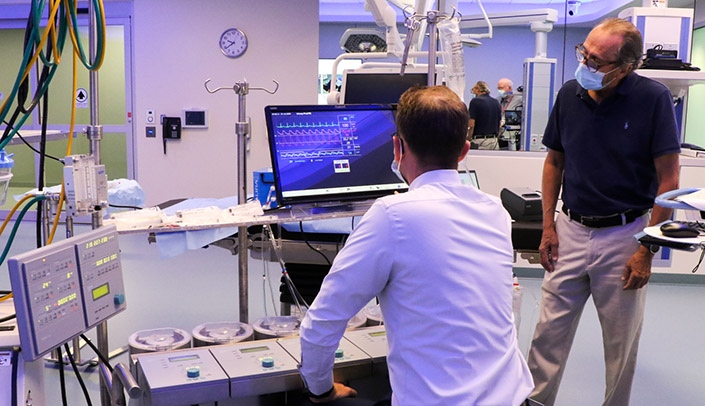A new collaboration between iEXCEL and the College of Allied Health Professions’ clinical perfusion education program, including unique training at the Dr. Edwin G. & Dorothy Balbach Davis Global Center, will better prepare future health professionals to perform open-heart surgery.
Such surgery requires delicate balance, said David Holt, director of clinical perfusion education, in the College of Allied Health Professions.
“The body,” Holt said, “is an extremely complicated system.”
Our heart and lungs must work together in synchronized fashion. Our lungs absorb oxygen, and the heart pumps it, in our blood, throughout the body, ensuring we receive proper nutrition and oxygen. This process can be complicated to explain, Holt said, but the simple part to remember is that eliminating these relationships is, “not conducive with life.”
That relationship is even more complicated during open-heart surgery, Holt said, when “we actually stop the heart and the lungs.”
Now we’re really getting complicated.
But thankfully, we have a device called a heart-lung machine. And we have really smart people, clinical perfusionists, who use this technology to act as a patient’s heart and lungs, during surgery.
Just as lungs, heart, blood and oxygen work together, in a complicated yet seamless way, so too must clinical perfusionists mesh with their partners — surgeons and anesthesiologists.
“Every element has to be balanced, all on the same page. And that’s in a normal situation,” Holt said.
If something goes wrong, it gets even more complicated.
But the iEXCEL-allied health collaboration, using state-of-the-art equipment, will allow interprofessional teams of perfusion, cardiology, anesthesia, physician assistant and nursing students and fellows to practice this balance, through simulated open-heart surgeries.
“I shouldn’t say there’s nothing like it in the country,” Holt said. “But, my guess is there’s nothing like it in the country.”
Not just because of next-generation technology, but more so, the interprofessional aspect, Holt said.
“The ability to collectively get the group together to do a case is something that’s unique.”
The first simulated open-heart surgery is tentatively set for July 23. The team hopes to eventually do two a week on a regular basis.
“Our approach is, let’s do one,” and work the bugs out.
“Ultimately, I expect this to exactly mimick what a surgical procedure would be.”
That is, complicated. But, with this kind of practice, perfectly in sync.

Looks good
Proud on the leadership of the Clinical Perfusion Program and the College of Allied Health.
Mary Haven